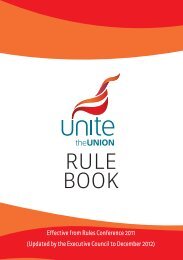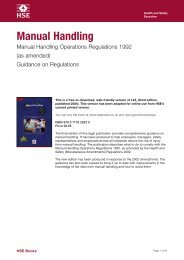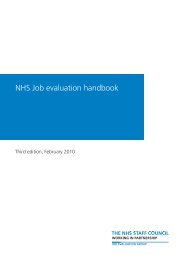How to prepare and manage a pay claim - Unite the Union
How to prepare and manage a pay claim - Unite the Union
How to prepare and manage a pay claim - Unite the Union
You also want an ePaper? Increase the reach of your titles
YUMPU automatically turns print PDFs into web optimized ePapers that Google loves.
Disclosure of information<br />
There is a legal requirement <strong>to</strong> provide information <strong>to</strong> recognised trade unions.<br />
The Trade <strong>Union</strong> <strong>and</strong> Labour Relations (Consolidation) Act 1992 states that every<br />
employer who negotiates with independent trade unions must provide<br />
information which allows <strong>the</strong>m <strong>to</strong> engage in collective bargaining with <strong>the</strong><br />
employer <strong>and</strong> which is related <strong>to</strong> matters <strong>the</strong> union is recognised <strong>to</strong> negotiate<br />
on on behalf of employees.<br />
The Act does not specify exactly what this information should be but <strong>the</strong> ACAS<br />
Code of Practice on ‘Disclosure of Information <strong>to</strong> Trade <strong>Union</strong>s for Collective<br />
Bargaining’ sets out some of <strong>the</strong> relevant items. These include:<br />
i) Pay <strong>and</strong> benefits: principles <strong>and</strong> structure of <strong>pay</strong>ment systems; job evaluation<br />
systems <strong>and</strong> grading criteria; earnings <strong>and</strong> hours analysed according <strong>to</strong><br />
work-group, grade, plant, sex, out-workers <strong>and</strong> home workers, department<br />
or division, giving, where appropriate, distributions <strong>and</strong> make-up of <strong>pay</strong><br />
showing any additions <strong>to</strong> basic rate or salary; <strong>to</strong>tal <strong>pay</strong> bill; details of fringe<br />
benefits <strong>and</strong> non-wage labour costs.<br />
ii) Conditions of service: policies on recruitment, redeployment, redundancy,<br />
training, equal opportunity <strong>and</strong> promotion; appraisal systems; health,<br />
welfare <strong>and</strong> safety matters.<br />
iii) Manpower: numbers employed analysed according <strong>to</strong> grade, department,<br />
location, age <strong>and</strong> sex; labour turnover; absenteeism; overtime <strong>and</strong><br />
short-time; manning st<strong>and</strong>ards; planned changes in work methods, materials,<br />
equipment or organisation; available manpower plans; investment plans.<br />
iv) Performance: productivity <strong>and</strong> efficiency data; savings from increased<br />
productivity <strong>and</strong> output, return on capital invested; sales <strong>and</strong> state of order<br />
book.<br />
v) Financial: cost structures; gross <strong>and</strong> net profits; sources of earnings; assets;<br />
liabilities; allocation of profits; details of government financial assistance;<br />
transfer prices; loans <strong>to</strong> parent or subsidiary companies <strong>and</strong> interest charged.<br />
In addition, public sec<strong>to</strong>r employees may be able <strong>to</strong> rely upon <strong>the</strong> Freedom of<br />
Information Act 2000 (<strong>the</strong> FOIA) which came in<strong>to</strong> force on 1st January 2005 <strong>and</strong><br />
imposed huge new responsibilities on government.<br />
The FOIA provides a right for any individual or organisation <strong>to</strong> access all<br />
recorded information held by a public authority in <strong>the</strong> course of carrying out its<br />
public duties, subject <strong>to</strong> various conditions <strong>and</strong> exemptions. It is not necessary<br />
for <strong>the</strong> person making <strong>the</strong> request <strong>to</strong> provide a justification or explanation for<br />
<strong>the</strong> request. Nor is <strong>the</strong>re a formal procedure for making requests. Any written<br />
request (via letter, email or fax) is sufficient. Any request made should contain a<br />
description of <strong>the</strong> information sought. It is not necessary <strong>to</strong> state formally that a<br />
request is made under <strong>the</strong> FOIA although it is advisable <strong>to</strong> do so. The<br />
11

















